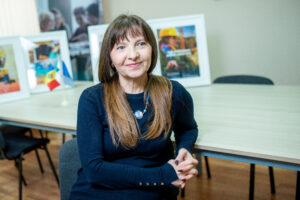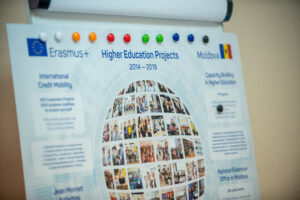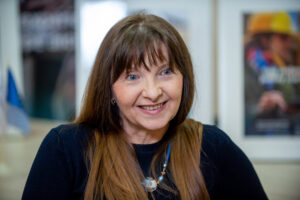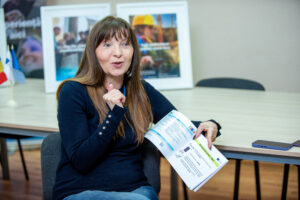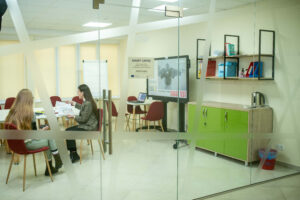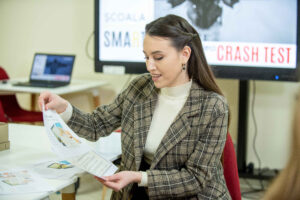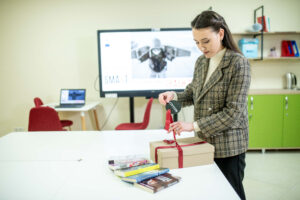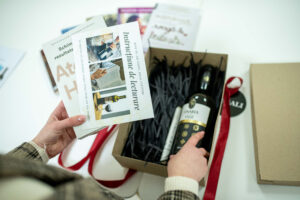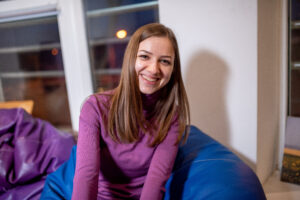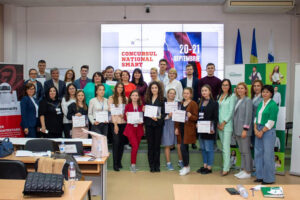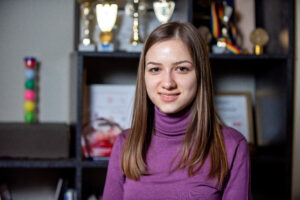
Bringing Moldovan students and business closer through Erasmus+
When you think of the European Union’s Erasmus+ programme, the first thing that comes to mind is studying in the EU. But Erasmus+ is not just about that. One important part of the programme is the development of projects to improve the quality of higher education. These projects bring many changes to the country’s universities, create close ties between businesses and higher education and, just as importantly, provide significant opportunities for students.
“CapacityBuilding in Higher Education projects are the ones we are very proud of. They have to do with establishing relationships between universities and businesses, with configuring the curriculum in a way that prepares students for entrepreneurship and for the labour market in general. These projects are developed through international partnerships, and the experience of foreign countries is crucial to their success,” explains Claudia Melinte, coordinator of the National Erasmus+ Office in Moldova.
How the projects are implemented, and how universities can take part
All universities in the country can participate in these projects. Every year, 30-40 applications are submitted, from which 2-4 projects are chosen. Several national and European universities come together, develop a project proposal and submit an application. Each university can propose a project on its own, but they are required to form a consortium to apply. The university that proposed the idea manages the project, while the others participate.
“Every year, a project competition is announced. Moldovan universities can compete with EU universities in terms of project ideas,” Melinte explains.
Projects last at least three years and consist of three components: train-the-trainer, equipment, and reforming the university curriculum. The challenge for projects is not only to implement change, but to make it sustainable in the long term.
How projects help to develop entrepreneurship in Moldova
Moldovan universities are currently participating in 21 such projects, seven of which are coordinated by universities in Moldova, and ten of which are related to business and entrepreneurship: LMPI, CONNECT, COOPERA, WBLJOB, ReSTART, SMART, REFINE, AG-LAB, UniClaD, GEOBIZ.
These ten projects all engage business partners in addition to university consortia. They help design the university curriculum because they know how to explain what talents they need. On top of that, business practitioners are invited to lecture at universities.
“The projects try to teach students a different, more business-oriented way of thinking. Students dive into business differently: through seminars, master classes, and workshops,” says Melinte.
This collaboration strengthens the relationship between the business community and the university, which ultimately offers students more opportunities and experience.
One such project is SMART, launched by a Greek university, but designed in collaboration with Moldovan universities.
“The SMART project is interesting because of its concept. It aims at creating physical spaces where students, representatives of small and large businesses, and teachers meet in an informal setting and discuss business issues. In parallel, the authors of the project have been thinking about creating a virtual space that would allow businesses to post their challenges and students to come up with ideas for addressing these challenges. In a sense, the university should be a platform for this,” explains Claudia Melinte.
Both the Academy of Economic Studies of Moldova (ASEM), the State Agrarian University and Balti State University already have physical spaces created as part of the SMART project. The project also has an interactive component, which has offered students the opportunity to learn — through a special app — how to start up and develop a business.
A business idea inspired by a passion for reading
Violeta is one of the students who took advantage of the SMART project. She studies at the Academy of Economic Studies of Moldova and at another Romanian university concurrently. In September 2021, she saw the opportunity on social media and decided it was the perfect challenge for her.
“I followed a programme with many trainers and events. We developed business models, we had to reflect on who our potential customers were, what market segments to focus on, where we would raise funds,” says Violeta.
Violeta’s business idea came from her passion for books. The idea was refined together with the trainers through the course, and eventually it took the form of a gift box with a bottle of wine, a book and a special user manual, which provides different advice on reading the books and various assignments for readers. Each box is unique, and the user’s manual refers to the content of the book as well as to the person receiving the gift.
“I thought about spicing up the contents of the book with the contents of the box. I wanted the user manual to encourage people to read more. Each manual is linked to the contents of the book, it is not standard, but individual.”
At the end of the course, Violeta got a diploma, a business idea and a lot of new knowledge in the entrepreneurship domain. Violeta urges students to look out for such opportunities, as they can bring invaluable experience, as happened to her under the SMART project.
A family business about organic sea buckthorn
Another student who took advantage of the SMART project is Alexandra Bîcu, a third-year student at the Faculty of Economics, Business and Management of the Agrarian University of Moldova. On top of everything she learned, Alexandra also managed to win a cash prize under the project.
Alexandra found out about the opportunity from her teachers and at a special info session. As part of her involvement in the project, she came up with a business idea in the agricultural sector.
“The sessions were organised online, in an interactive format. They mentored me from scratch: how to choose a business idea, how to select the right business model for this idea, how to properly budget my income and expenses, how to use marketing tools. They also taught us legal aspects and the regulatory framework. These are things we often overlook, and if you don’t know them, it’s trickier to manage risks and investments. I’ve gained knowledge in many areas in such a short time,” says Alexandra.
After these sessions, Alexandra drew up a business plan and entered a business idea competition. There, she received a special award from one business partner of the competition.
“My idea was about a family business growing organic sea buckthorn on three hectares of land in the north of the country. I’ve chosen sea buckthorn because it is a niche crop becoming more and more popular both domestically and abroad,” says Alexandra.
The student says the programme opened up her horizons, thanks to the qualified mentors and well-trained teachers, both on theoretical and practical levels.
She is thinking of implementing her business idea, but for now is exchanging ideas and practices through the Smart Channel Online launched under the project, which brings together students, teachers and partners: “We continue communicating there; everyone posts their business ideas and we’re staying in touch.”
Such opportunities are available to students through projects implemented by universities with the assistance of Erasmus+, designed to bring the business environment and students closer together, with universities acting as a bridge to reform the education system.
“All these programmes facilitate higher education reform. There is still a long way to go. All the ten projects demonstrate different pathways,” concludes Claudia Melinte, the coordinator of The National Erasmus+ Office in Moldova.
Erasmus+ is the EU’s programme that supports activities in the field of education, training, youth and sports in Europe and around the world. The current Erasmus+ Programme, 2021-2027, offers opportunities for people of all ages, from all backgrounds, seeks to be even more inclusive and to support the green and digital transitions.
More information about Erasmus+ Programme in Moldova can be found on the official page of the National Erasmus+ Office.
Author: Elena Baranov
MOST READ
SEE ALSO

No, time is not on Russia‘s side

How to open an art business in Moldova: the experience of Alexandra Mihalaș

Be one step ahead of a hacker: check simple cybersecurity tips!
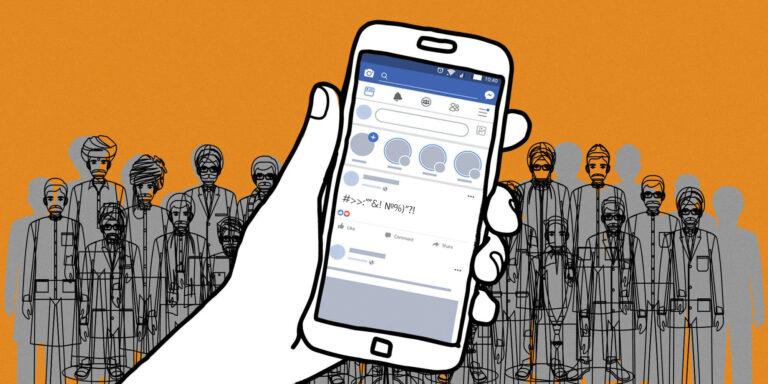
How to act and move on: strategies for women facing discrimination and online harassment
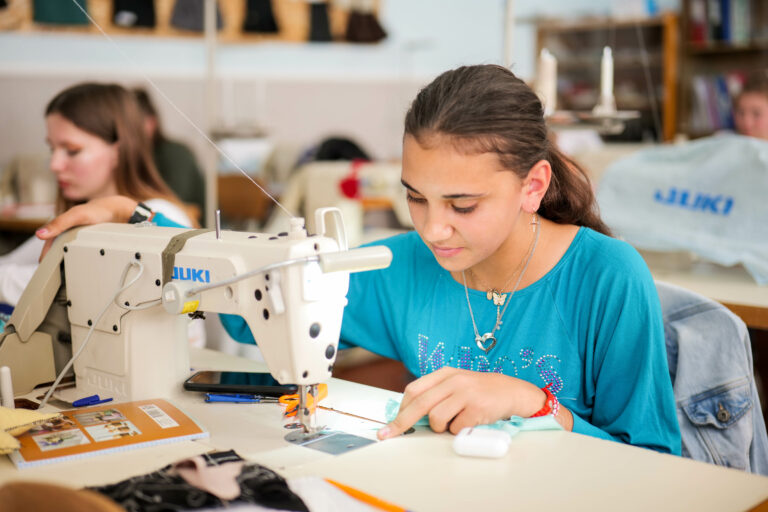
‘Learning is not a process but a journey’: the example of a school in Orhei
More campaign pages:
Interested in the latest news and opportunities?
This website is managed by the EU-funded Regional Communication Programme for the Eastern Neighbourhood ('EU NEIGHBOURS east’), which complements and supports the communication of the Delegations of the European Union in the Eastern partner countries, and works under the guidance of the European Commission’s Directorate-General for Neighbourhood Policy and Enlargement Negotiations, and the European External Action Service. EU NEIGHBOURS east is implemented by a GOPA PACE-led consortium. It is part of the larger Neighbourhood Communication Programme (2020-2024) for the EU's Eastern and Southern Neighbourhood, which also includes 'EU NEIGHBOURS south’ project that runs the EU Neighbours portal.

The information on this site is subject to a Disclaimer and Protection of personal data. © European Union,
